#western front
Text
Starting up an Avro Lancaster at the Canadian Warplane Heritage Museum.
807 notes
·
View notes
Text
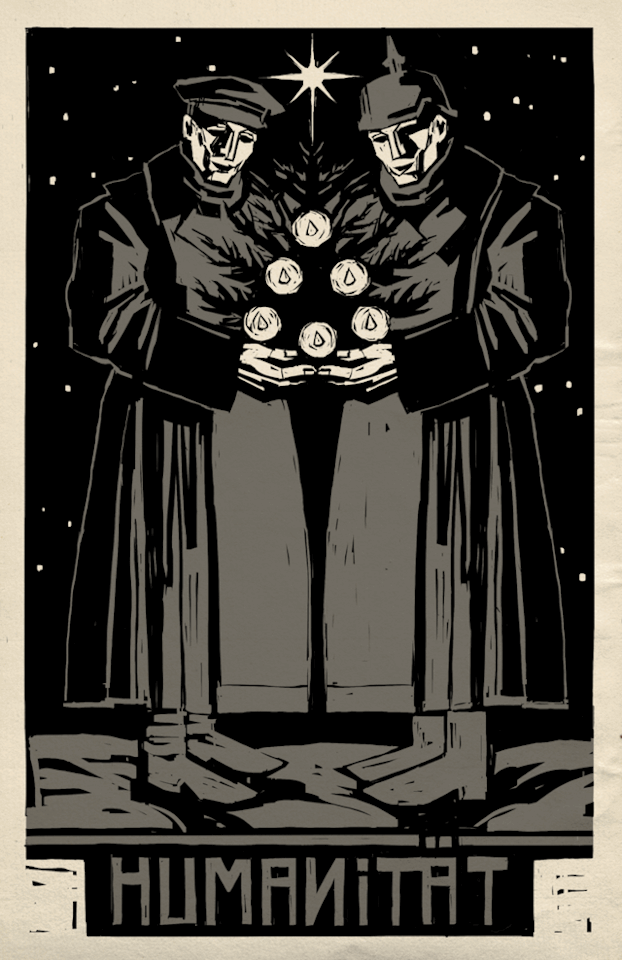
happy holidays everyone, stay safe <3
184 notes
·
View notes
Text

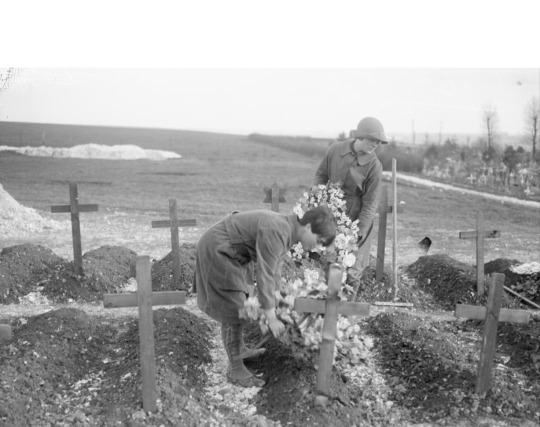
Members of the Women's Army Auxiliary Corps (WAACs) tending the graves of fallen British soldiers in a cemetery at Abbeville, 9 February, 1918.
266 notes
·
View notes
Text

British and German soldiers hold a Christmas truce during the Great War, 1914
by Angus McBride
#first world war#world war one#christmas truce#christmas#truce#british#german#english#art#angus mcbride#history#europe#european#western front#ww1#wwi#world war i#world war 1#the great war#britain#england#germany#soccer#football
750 notes
·
View notes
Text

“Infantrymen of the Third US Army staying close to the wall as they advance through the rubble-strewn streets of Echternach, Luxembourg, February 7th, 1945.”
Source: https://tinyurl.com/Wwii-soldiers
#ww2#ww2 history#world war 2#world war ii#history#western front#american soldier#ww2 photo#war history#wwii history#wwii#wwii era
38 notes
·
View notes
Text
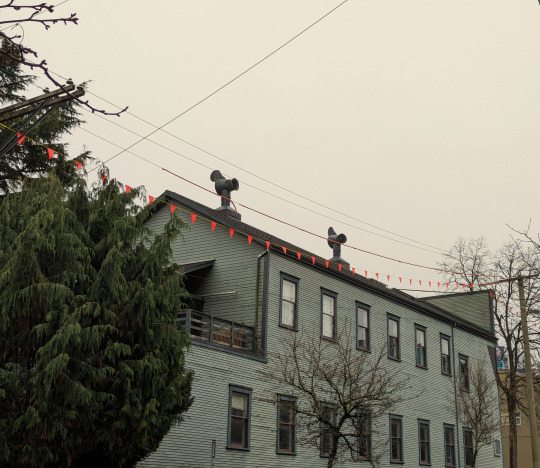
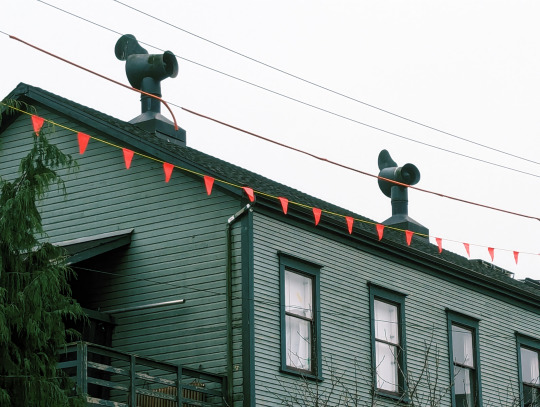
Western Front building
#western front#non-profit artist-run centre#mount pleasant#vancouver#local#photographers on tumblr#original phography
33 notes
·
View notes
Text
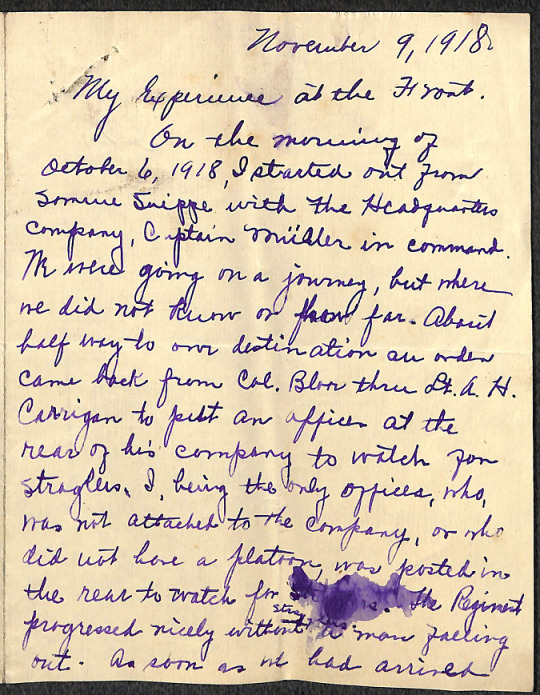

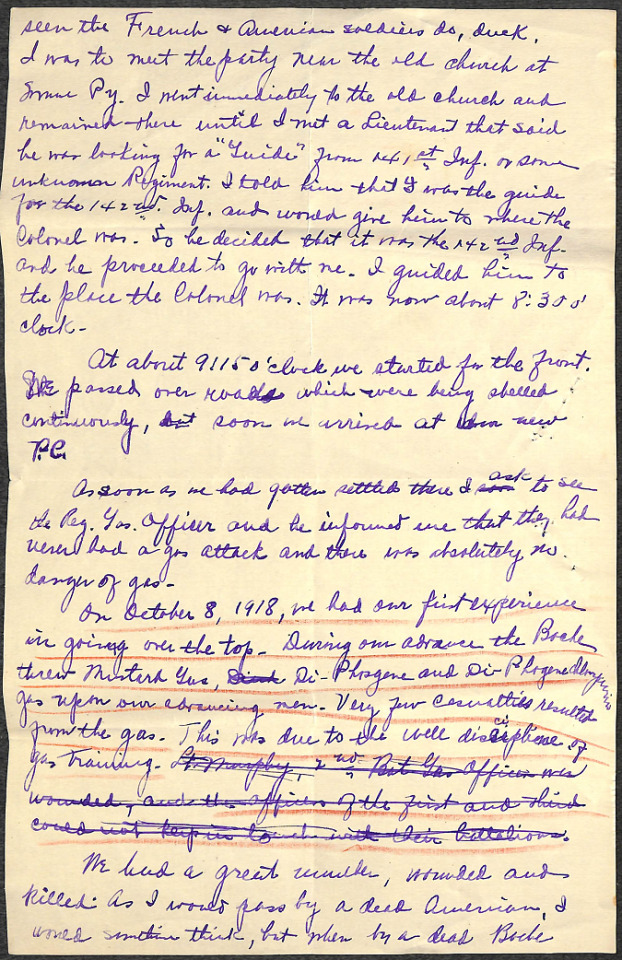
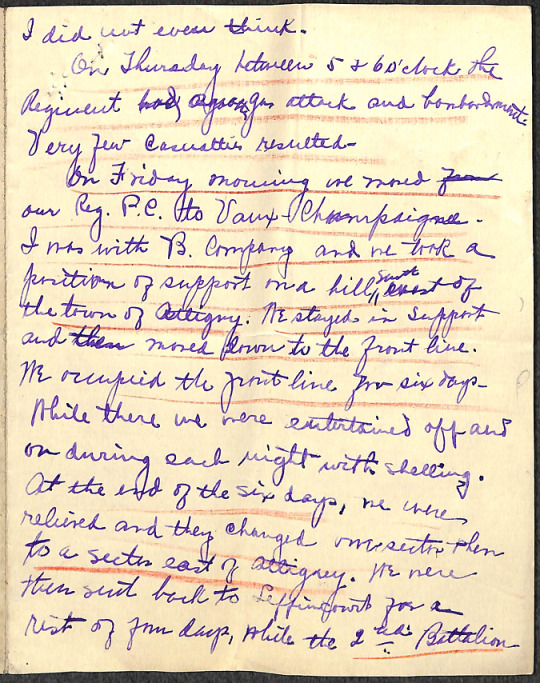

WWI Experience of Capt. Clark Owsley
Record Group 120: Records of the American Expeditionary Forces (World War I)Series: Records of Divisions
November 9, 1918 My Experience at the Front On the morning of October 6, 1918 , I started out from Somme Suippe with the Headquarters company , Captain Miiller in command We were going on a journey but where we did not know or [overwritten: from] how far About half way to our destination our order came back from Col. Bloor thru Lt. A.H. Carrigan to put an officer at the rear of his company to watch for straglers I being the only offices who was not attached to the company, or who did not have a platoon, was posted in the rear to watch for [illegible due to blurred ink stain]. The regiment progressed nicely without ^stray^ [illegible due to blurred ink stain] man falling out. As soon as we had arrivedat our destination, I reported to [crossed out : the] Capt. Miller, that the Regiment [crossed out: had ] did not have any stragglers . We arrived at our destination about three-thirty and about six o'clock, Capt. Nelson sent for me to report to him. I reported and he gave me orders to go to Somme-Py and meet a party of officers and men, who were to guide us into the line. This was my first knowledge of us going[ g overwritten] into the front. I got in^to^ [into] a motorcycle- side car & was driven to Somme-Py. When I arrived there, the Boche were shelling the cross-roads and my first knowdege of this was that the Frecnh and American soldiers were ducking their heads & falling into [typed above crossed out "on their"] ditches. I got out of the car & soon became doing the same as I hadseen the French & American soldiers do, duck. I was to meet the party near the old church at Somme Py. I went immediately to the old church and remained there until I met a Lieutenant that said he was looking for a "Guide" from 141st Inf. or some unknown Regiment. I told him that I was the guide for the 142nd Inf. and would give him to where the Colonel was. So he decided that it was the 142nd Inf. and proceed to go with me. I guided him to the place the Colonel was. It was now about 8:30 o' clock. At about 9:15 o'clock we started for the front. ("The" over written] We passed over roads which were being shelled continuously, but soon we arrived at our new P.[?G or C]. As soon as we had gotten settled there I [ "soon" crossed out] ask to see the Reg. Gas. Officer and he informed me that they had never had a gas attach and there was absolutely no danger of gas. [The following paragraph is underlined in red] On October 8, 1918, we had our first experience in going over the top. During our advance the Boche threw mustard gas, di-phosgene and Di Phogene chloropicrin [see comments ] gas upon our advancing men. Very few casualties resulted from the gas. this was due to the well discipline ["ci" is written above crossed out "er" ] of gas training. [crossed out] Lt. Murphy, 2nd Bat. Gas Officer was wounded, and the officers of the first and third could not keep in touch with the their battalion. [end crossed out] We had a great [? number], wounded and killed. As I would pass by a dead American, I would sometime think, but when by a dead Boche [full transcription at link]
38 notes
·
View notes
Text
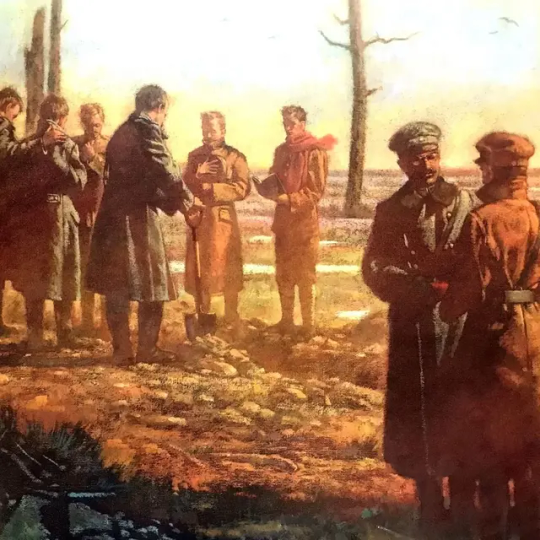
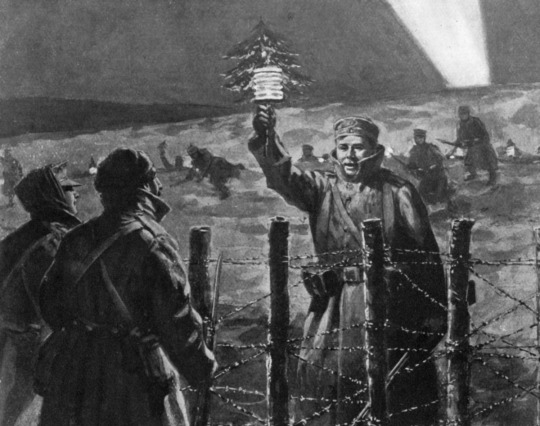
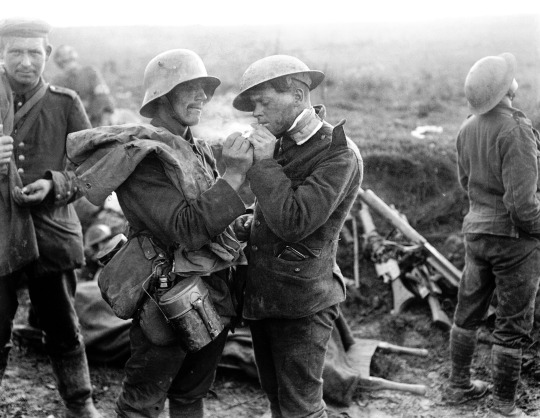
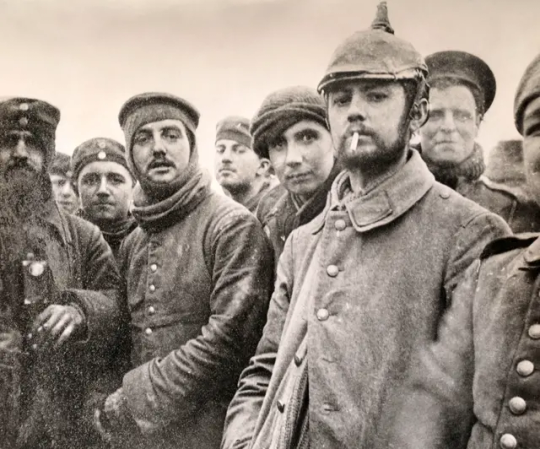

The Christmas truce was a series of widespread unofficial ceasefires along the Western Front of the First World War around Christmas 1914.
The truce occurred five months after hostilities had begun. Lulls occurred in the fighting as armies ran out of men and munitions and commanders reconsidered their strategies following the stalemate of the Race to the Sea and the indecisive result of the First Battle of Ypres. In the week leading up to 25 December, French, German and British soldiers crossed trenches to exchange seasonal greetings and talk. In some areas, men from both sides ventured into no man's land on Christmas Eve and Christmas Day to mingle and exchange food and souvenirs. There were joint burial ceremonies and prisoner swaps, while several meetings ended in carolling. Men played games of football with one another, creating one of the most memorable images of the truce. Hostilities continued in some sectors, while in others the sides settled on little more than arrangements to recover bodies.
The following year, a few units arranged ceasefires but the truces were not nearly as widespread as in 1914; this was, in part, due to strongly worded orders from commanders, prohibiting truces. Soldiers were no longer amenable to truce by 1916; the war had become increasingly bitter after the human losses suffered during the battles of 1915.
The truces were not unique to the Christmas period and reflected a mood of "live and let live", where infantry close together would stop fighting and fraternize, engaging in conversation. In some sectors, there were occasional ceasefires to allow soldiers to go between the lines and recover wounded or dead comrades; in others, there was a tacit agreement not to shoot while men rested, exercised or worked in view of the enemy. The Christmas truces were particularly significant due to the number of men involved and the level of their participation—even in quiet sectors, dozens of men openly congregating in daylight was remarkable—and are often seen as a symbolic moment of peace and humanity amidst one of the most violent conflicts in human history.
#christmas#1914 christmas truce#world war i#first world war#ww1#1910s#20th century#western front#european history#ceasefire#peace and goodwill to all men
37 notes
·
View notes
Text
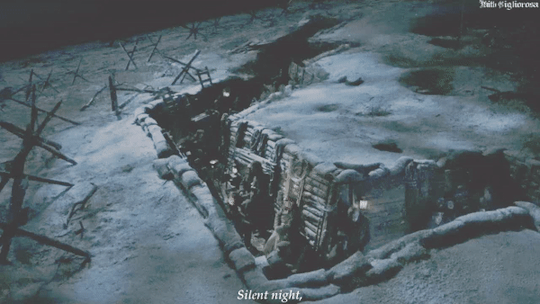

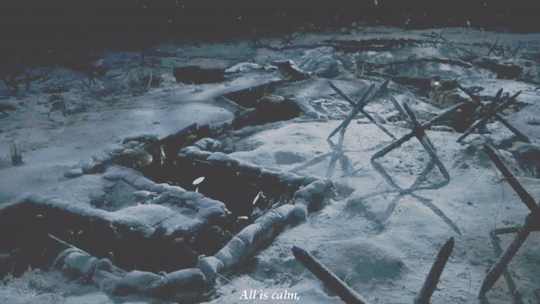

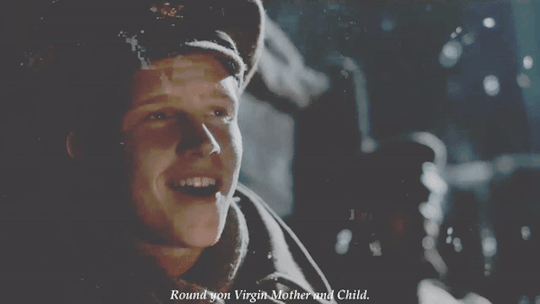


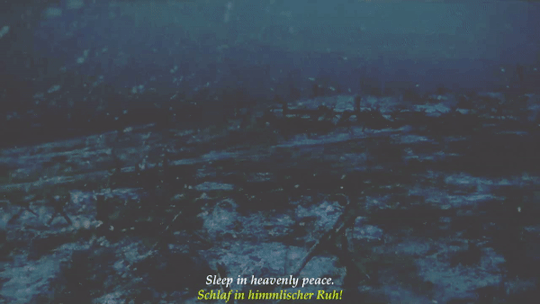
Christmas Eve 1914
[...] The Germans placed candles on their trenches and on Christmas trees, then continued the celebration by singing Christmas carols. The British responded by singing carols of their own.
#christmas#christmas truce#wwi#world war one#world war i#world war 1#history#world history#first world war#war#germany#british#soldiers#1914 christmas truce#western front#the great war#silent night#stille nacht#gif#dailygifs#mygifs#faithgigliorosa
50 notes
·
View notes
Text
Great War💀
#pixel art#retro aesthetic#lofi#artists on tumblr#art#artwork#conflict#apocalypse#polishwave#politics#greatwar#world war 1#world war one#in the trenches#trenches#western front
16 notes
·
View notes
Text
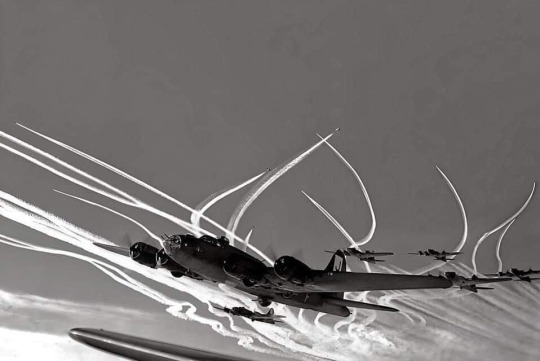
B-17s being escorted by P-47 fighters on their way to Germany, 1943.
219 notes
·
View notes
Text

This poem extols the virtues of Princess Patricia's Canadian Light Infantry, a privately raised battalion. In early 1915, it became the first Canadian unit to serve on the Western Front. The Princess Pat's fought with the 27th British Division before joining the Canadian Corps in late 1915.
#Princess Patricia's Canadian Light Infantry#PPCLI#western front#historical photos#world war 1#1917#canadian history#history#german armor#eastern front#artillery#world war 1 stories#ww1#ww1 poetry#ww1 stories#ww1 art#ww1 history#wwi#world war one#The Great War#The First World War
15 notes
·
View notes
Text
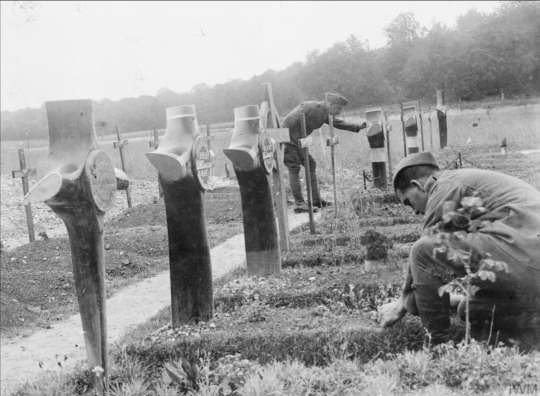
War graves of airmen near Hesdin using damaged propellers as headstones, 14 July 1918.
174 notes
·
View notes
Text
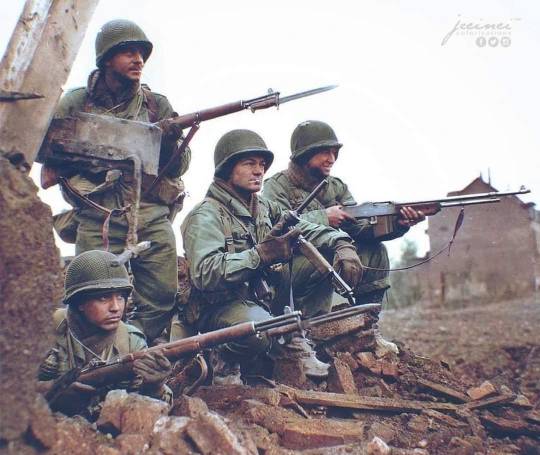
79 years ago today, soldiers of the 8th Infantry Division await orders to advance and clear a building of a German platoon in Düren, Germany.
Jecinci on the colorization 🎨
#meanwhile in germany#wwii#european theater#western front#us army#browning automatic rifle#colorized
8 notes
·
View notes
Text

not sure if I'll post the whole drawing
#WWI#Russian Expeditionary Force in France#French soldier#Russian soldier#Western Front#1918#OCs#historical fiction#my drawings
39 notes
·
View notes
Text
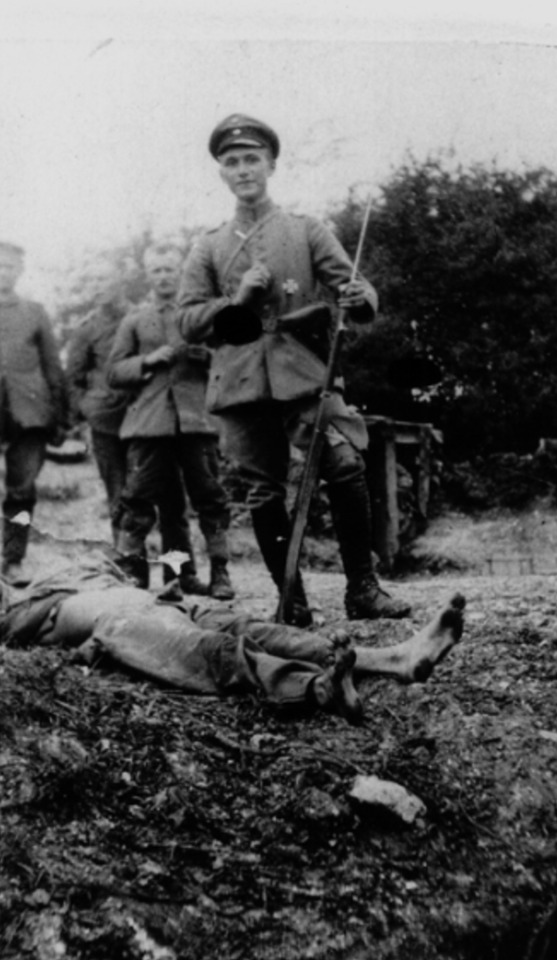
Ernst Jünger with a fallen British soldier after repelling an attack on his company's position (1917).
141 notes
·
View notes